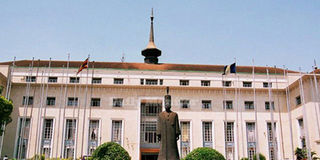Buganda should uphold its people’s wishes

Bulange Mengo is one of Buganda kingdom's administrative centers. PHOTO/FILE.
As the political noose continues to tighten around Buganda’s neck, Mr Gawaya Tegulle joins scores of other ‘genuine’ observers who have long tasked the establishment at Mengo, Buganda’s chief administrative seat, to play with a full deck in so far as the resolution of the Buganda question is concerned.
The full rather than piecemeal settlement of this complex and multifaceted question, it is hoped, will go a long way in not only averting the rather imminent disaster that might befall Uganda once more, but also set the country on a steady path of meaningful peace, stability, development, prosperity and cohesion, among her ethnically and religiously diverse peoples.
I took both an instant liking and disliking to his article, ‘Buganda: The first born busy playing omweso as thieves loot their home’ in the Sunday Monitor of January 3. A liking because quite remarkably, we generally share sentiments in regard to Mengo’s current lukewarm approach in asserting Buganda’s right to not only have a say on Uganda’s day-to-day political developments, but also to fully partake of her stake in Uganda, Africa and the rest of the globe; and to both protect and preserve it.
And conversely, a disliking because his views on federo/federalism and decolonisation have a twisted bit about them.
It is of little surprise, though, that Mengo, generally speaking, has deliberately chosen to turn a blind eye to these pleas and, instead, is keen on pursuing a rather hazardous and cultic policy course hence a total blow to the well-being and aspirations of the people of Buganda.
One, therefore, gets the urge to speak up not so much to find fault with Katikkiro Charles Peter Mayiga’s administration, but rather because of the abundant need to examine the nature of its loyalty and interest towards the ‘Nnamulondo’ (Buganda throne) as well as to caution it against continuing to tread a path that further shortchanges the people of Buganda from the pursuit of their self-determination; keeps them under encirclement; and emasculates the integrity of ‘Nnamulondo’.
What, for instance, is ‘unsual’ about Mr Mayiga and others of less note is that they are the only Mengo officials still keen on publicly defending their obwerufu (transparency) mantra even when the official record reveals otherwise:
“... corruption amongst kingdom employees and officials [has] caused the failure of leading by example... If they are... corrupt...in their handling of the masses, then we shall fail to convert the masses to the cause.”
The central challenge and/or difficulty, however, concerns how the establishment will respond to these issues and more. Long gone are the days when life at the royal court was ‘solely’ about okweyanza, prostration, parties, applause, cheering, polite decorum, etc.
The people of Buganda, one holds, would very much enjoy holding onto these traditions, but in a more meaningful and progressive way.
Besides, rightfully criticizing and engaging with the institution’s rank and file, they equally very much desire to freely debate its public statements, policies, resolutions, budgets, as well as trips to the deals house at Entebbe on various platforms, including its own media houses.
I am one of those, though, who shall not yield to Tegulle’s view that “While Uganda has glaring problems, Buganda, or at least its leadership at Mengo, has managed to look inward demanding for federalism [or] federo [federalism] and ebyaffe [our things]; rather than coming out beyond all that, to articulate strategic solutions to Uganda’s problems.”
Jonathan Mwesigwa S, [email protected]




